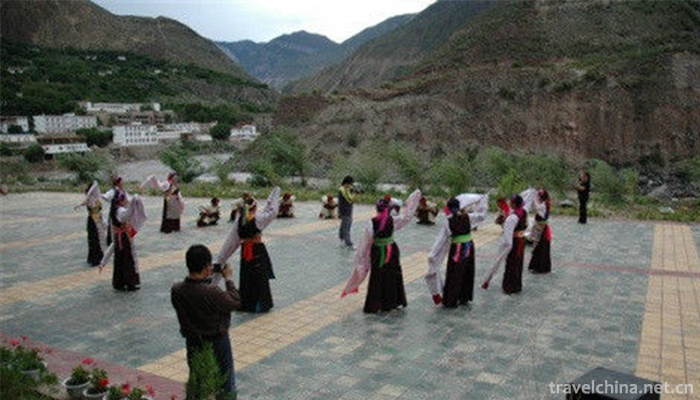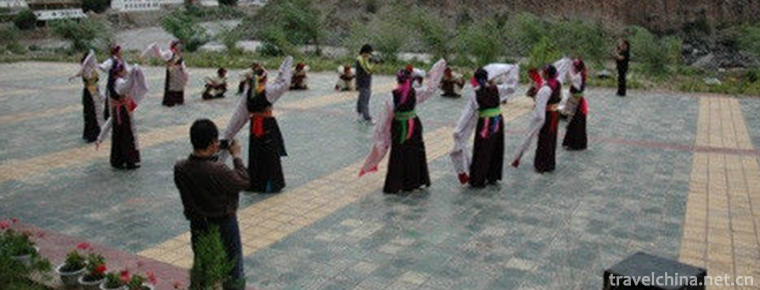Mangkang Trichord Dance
Mangkang Trichord Dance
Sanxian Dance originated in Quzika Township, Mangkang County, Changdu District. It has the unique charm of simplicity, elegance, melodiousness and ease, and is deeply loved by the masses. Passengers played an important role in the spread of Sanxian, making Sanxian Dance a very famous dance in southeastern Tibet and at the junction of Tibet, Sichuan and Yunnan.
In June 2008, the Mangkang Sanxian Dance declared by Mangkang County of Tibet Autonomous Region was listed in the second batch of national intangible cultural heritage list with the approval of the State Council.
Heritage serial number: 683 III-86.
historical origin
Sanxian Dance originated in Daxu Village, Quzika Township, Mangkang County. According to textual research, it has a long history of four or five hundred years. So far, besides its wide spread in the township, it is also well-known in the surrounding areas. Sanxian Dance is accompanied by Sanxian Qin. It is said that the head of the piano is the head of the dragon, the body of the piano is the backbone of the dragon, and the strings are the tendons of the dragon. Today's Sanxian Qin is made of pure wood.
artistic characteristics
The performance of tri-string dance is to gather men and women to dance and sing, with beautiful lyrics, melodious rhythm, fast and slow. Music is characterized by simplicity, brightness and fluency in singing. Not limited by the number of people, venues and other constraints, men and women singing together, singing while dancing, generally in the melodious and gentle music, smooth and happy performance in the midfield, rising and enthusiastic end, are to avoid disasters and dispel disasters, celebrate harvest, wish good luck as the main content.
Inheritance status
But nowadays, Sanxian Dance is facing the situation of losing its heritage. After careful arrangement and excavation by a large number of literary and artistic workers and old folk artists in the folk art troupe of Mangkang County, this unique art of Mangkang County has shown its former elegance again. It is said that the original dance has 13 programs, but only 7 are still handed down. After liberation, the tri-string dance won the audience's praise in the literary and artistic performances of the founding Congress in Changdu area on the occasion of the founding of Tibet Autonomous Region in 1965. Today, nearly 200 artists can dance seven dances that have been passed down to this day. At present, driven by the local tourism industry, with a certain mass base, it has gradually attracted tourists and literary and artistic circles both inside and outside the region. This unique art has a growing influence in adjacent provinces and regions. Especially with the further implementation of the Party's national policy and the literary and artistic policy of "letting a hundred flowers blossom", the Mangkang Quzika Trichord Dance has gradually become a relatively complete performance system with its vigorous vitality and extremely deep mass foundation, radiating the unique glory of the unique culture of southeastern Tibet, and has made due contributions to the promotion and promotion of the socialist spiritual civilization construction.
Inheritance significance
Quzika Trichord Dance in Mangkang County has a long history, ancient magic, unique form, strong national style, rich plateau characteristics, rich content of singing and dancing, and its singing and dancing tradition is precious.


-
2.Aerge Mountains
Mount Alge, A'erge Mountains, a mountain range at the junction of Xinjiang Uygur Autonomous Region, Tibet Autonomous Region and Qinghai Province, China.
Time 2018-11-01 -
3.Shapotou National Nature Reserve Ningxia
Shapotou: National AAAAA class tourist attraction, national desert ecological nature reserve, global environmental protection 500 best units, national fitness 20 famous landscapes, special prize for s
Time 2018-12-12 -
4.Nansha Garden Hotel Guangzhou
Nansha Garden Hotel, a brand-new landmark building in Dawan District and New Nansha, was commissioned on June 20, 2018. The brand of Garden Hotel added a unique creative design hotel.
Time 2018-12-16 -
5.Yeliguan Scenic Area
Yeliguan Scenic Area is located in Lintan County, with Yeliguan of Lintan County as the center. It is divided into four scenic areas: Lianhuashan, Xixia, Dongxia and Yehai Lake.
Time 2018-12-26 -
6.Rong Guo Fu
Rongguofu, located in Zhengding County, Shijiazhuang City, Hebei Province, is a group of archaized buildings with the culture of the late Ming and early Qing Dynasties as the background. In 1986
Time 2019-02-07 -
7.Tianzhu Mountain National Forest Park
Tianzhushan National Forest Park, a national 4A-level tourist attraction, is located in Tianzhushan Town, 30 kilometers southeast of Shanyang County Town, Shaanxi Province, south of Huling and north o
Time 2019-02-22 -
8.Ningbo Gold and Silver Embroidery
Ningbo gold and silver embroidery is one of the Han folk handicraft products embroidered on silk fabrics with various color threads, gold threads and silver threads. With its strong local characterist
Time 2019-06-07 -
9.Sugar Eggs
Laozao is a local snack, belonging to Sichuan cuisine. Laolao, a kind of wine brewing in ancient Chinese, is a Sichuan dialect, that is, boiled eggs with wine brewing. Put the mash in the pot and boil
Time 2020-03-09 -
10.Administrative division of Deyang
Deyang City has 6 county-level administrative divisions (Municipal District 2, county-level city 3, county-1), and 84 township level administrative divisions (street 13, town 67, township 4). It covers an area of 5911 square kilometers and has a population of 3.92 million.
Time 2020-12-14 -
11.Yibin transportation
Yibin is a transportation hub city in South Sichuan, which is famous for its comprehensive three-dimensional transportation network of water, land and air. It is located at the starting point of the golden waterway of the Yangtze River and the strategic point of Sichuan Yunna
Time 2020-12-18 -
12.Dazhou landform
The terrain of Dazhou city is high in the Northeast (Daba Mountain Area) and low in the Southwest (Basin hilly area). The highest point is datuanbao, Jichang Township, Xuanhan County, with an altitude of 2458.3 meters; the lowest is Tianguan village, Wan
Time 2020-12-20